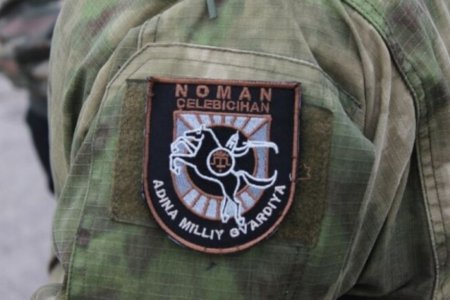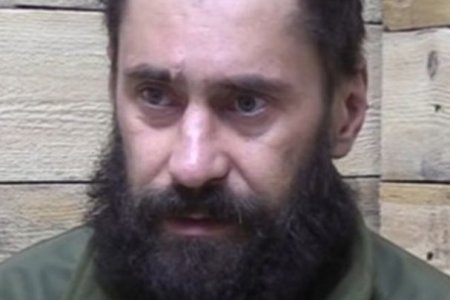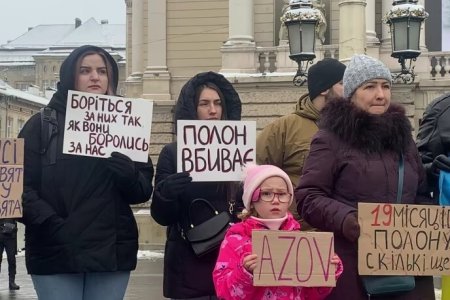
Two Crimean Tatar political prisoners who are already illegally imprisoned in Russia could face deportation to Uzbekistan in a chillingly cynical echo from the Soviet Deportation of the Crimean Tatar people in 1944. It was that crime, recognized in Ukraine as an act of genocide that led to Nasrulla Seidaliev and Lenur Seidametov being born in Uzbekistan, which Russia is now threatening to use as excuse for deporting them to a country to which they have no attachment. It is possible that these are empty threats, perhaps aimed at putting pressure on the men, but there has thus far been little that Russia would not do, and such deportations would be another form of intimidation and terror against all Crimean Tatars.
Lenur Seidametov
While the majority of Crimean Tatar political prisoners over the age of 30 were born in Uzbekistan, most returned, with their families, decades ago. Seidametov, however, only arrived in Crimea in 2012. His wife Adzhire explained to Suspilne Crimea that Seidametov (b. 1985) had gone through all the procedure, had obtained a temporary residence permit and was supposed to receive his Ukrainian passport in 2014. Russia’s invasion and annexation, however, got in the way, and he ended up not receiving the passport. He recently wrote to her that he is held in the Voronezh SIZO [remand prison], and that he has been told he awaits “an expedition to Uzbekistan’.
Suspilne spoke with Yusuf Kurkchi, the First Secretary of the Ukrainian Embassy in Uzbekistan. He confirmed that the situation is serious as Seidametov has only Russian and Uzbekistan citizenship, with his residence permit too little to enable his return to Ukraine.
While Oleksiy Tilnenko from Crimea SOS believes that public pressure could help prevent such an extradition, he acknowledges that Russia is disregarding virtually all European Court of Human Rights judgements. There have already been precedents. In 2018, Russia deported Crimean Tatar Nedim Khalilov to Uzbekistan against his will. after illegally taking him from his Crimean home and holding him in a ‘centre for foreigners’ in Russia for 18 months.
In May 2021, the Crimean FSB killed Uzbek refugee Nabi Rakhimov who had been living peacefully, with his wife and two younger children, in occupied Crimea. Russia had earlier been found to have violated Rakhimov’s rights by the European Court of Human Rights and had been prohibited from extraditing him to Uzbekistan where he (and his family) faced religious persecution. Instead, the FSB killed him, and then imprisoned his wife, Sokhiba Burkhanova, in a centre for foreign nationals before forcibly deporting her to Uzbekistan.
Lenur Seidametov has been imprisoned since 17 February 2021 and is now serving a 13-year sentence without any recognizable crime.
See: Russia sentences two Crimean Tatars to 17 and 13 years for talking about their faith
Nasrulla Seidaliev
The situation with Seidaliev (b. 1959) is even more lawless since he has Ukrainian citizenship, and there can be no possible justification for sending him to Uzbekistan.
Apparent plans to deport Seidaliev were reported by Zarema Barieva from the Crimean Tatar Resource Centre. Any such attempt would be entirely illegal, Yusuf Kurkchi says, and suggests that Seidaliev, a Ukrainian citizen, would likely not even be accepted by the Uzbekistan authorities. It does seem possible, as Oleksiy Tilnenko from Crimea SOS, suggests, that this is a method of pressure aimed at breaking Seidametov.
Such a deportation of a Ukrainian citizen to Uzbekistan would be a dangerous precedent and would send a chilling message to all Crimean Tatars, especially those whose courageous civic journalism and activism have made them favourite FSB targets for persecution.
Seidaliev , who turned 66 in Russian captivity on 29 April 2025 was abducted from Kherson oblast on 4 March 2022, immediately after Russia began its full-scale invasion of Ukraine. He is one of over 50 Crimean Tatars and other Ukrainians arrested and sentenced on surreal charges in revenge for the civic blockade of Crimea in 2015-16. The charges in all cases are of alleged involvement, while in mainland Ukraine in the Noman Çelebicihan Battalion. Despite the latter’s name, this was a peaceful, unarmed and perfectly legal civic organization whose stated objective, namely the liberation of Crimea from Russia’s occupation, was and remains in full accordance with the position of the UN and other international bodies. Unthwarted by the lack of any jurisdiction or grounds, Russia has not only claimed the Battalion to be ‘a terrorist organization’ but has used it as a weapon of political repression, especially against Ukrainian citizens abducted from territory occupied since its full-scale invasion of Ukraine.
As in all such cases to date, Seidaliev was charged with “participation in the activities of an unlawful armed formation acting on the territory of a foreign country for purposes which are against the interests of the Russian Federation” under Article 208 § 2 of Russia’s criminal code. He was sentenced to nine years’ maximum-security imprisonment.



